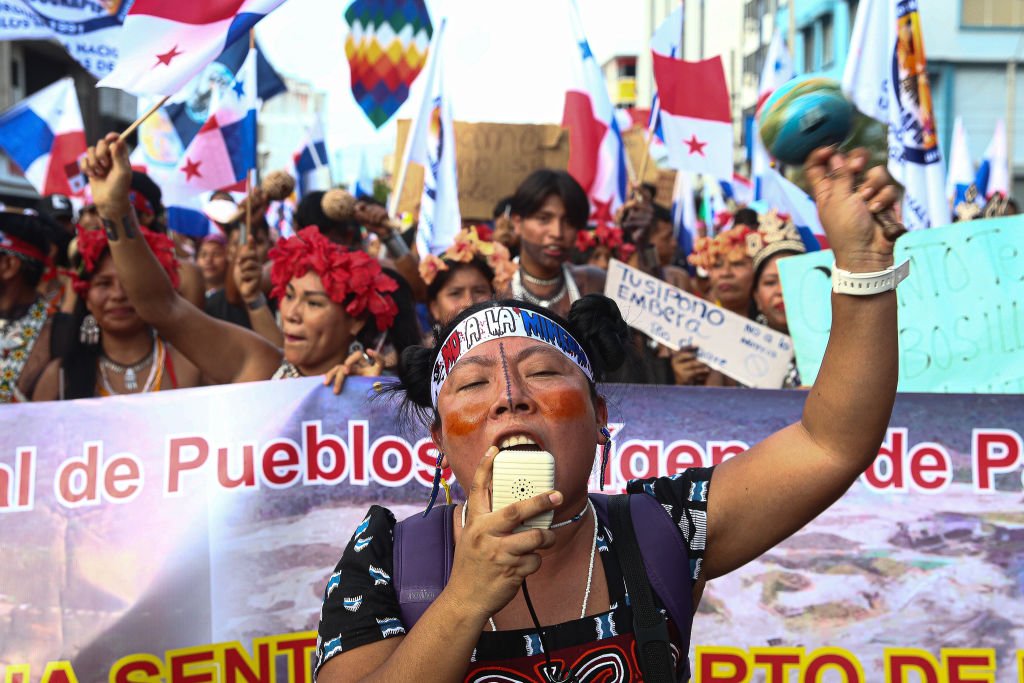Introduction
José Raúl Mulino sworn in as Panama’s President
On 1st July 2024, José Raúl Mulino was sworn in as President of Panama, assuming office during a period of heightened concern over the escalating migration in the Darien Gap. This dense stretch of jungle, which marks the border between Colombia and Panama, has seen a sharp rise in the number of migrants crossing through its perilous terrain.
Mulino, a former security minister, has pledged to shut down this corridor, citing ties to drug and human trafficking. Additionally, Panama signed a memorandum with the USA to fund repatriation flights for migrants entering Panama “illegally,” marking a departure from previous policies.
Domestically, Mulino’s presidency will tackle challenges like managing the Panama Canal during a drought, addressing fiscal deficits following the cancellation of a mining concession, and promoting poverty reduction, youth employment and infrastructure development.
Guna Indigenous people displaced by climate change
Panama’s first climate change-induced displacement is underway as 1,200 members of the Guna Indigenous community prepare to leave their ancestral island home of Carti Sugtupu. Rising sea levels have made the island in the Guna Yala region increasingly prone to flooding.
Regular submersion of homes and limited access to essential services, including clean water, sanitation and reliable electricity, have exacerbated living conditions. In response, in June 2024, the Panamanian government provided newly constructed homes in the mainland settlement of Nuevo Carti, marking the country’s first climate-induced relocation. This relocation follows sustained pressure from civil society organisations, consistently highlighting the government’s delay in providing the necessary infrastructure to relocate the Guna community to a safer location.
This forced relocation represents a significant cultural loss. The Guna are one of Panama’s most significant Indigenous peoples, with an estimated population of 62,000. They inhabit the eastern Caribbean coast and 49 of the 400 islands in the Guna Yala archipelago. In recent years, their deep connection to the sea has been jeopardised by the impacts of global warming, particularly rising sea levels.
Association
Activists continue to face prosecution after 2023 anti-mining protests
As documented by the CIVICUS Monitor, nationwide protests erupted across Panama in 2023 in opposition to a proposed mining contract. In response, authorities have pursued criminal charges against protesters and activists. According to Radio Temblor International, a platform for independent community media, environmental defenders from the Donoso area in Colón province, including Arcadio Pitti and Sabino Ayarza, are among those facing charges. Minera Panamá has filed a formal criminal complaint through the Public Prosecutor’s Office, alleging property damage during the November 2023 protests. Pitti, Ayarza and others are preparing their legal defence with the support of their lawyers.
In a separate but related case, Eduardo Baltazar, a fisherman from Punta Rincón, Colón province, also faces prosecution. Baltazar was arrested during the November 2023 protests while engaging in his usual fishing activities. Prosecutors allege that Baltazar attacked aeronaval service units. Initially scheduled for 2nd July 2024, his intermediate hearing at the Criminal Accusatory System in Colón was postponed to 14th October 2024 due to delays in submitting expert evidence by the Public Prosecutor’s Office. Baltazar remains subject to precautionary measures, requiring him to report to the Casa de Paz in Coclé del Norte on the 15th and 30th of each month.
Defence attorney Felipe Cabeza Dixon, who represents the activists, has raised concerns over the charges and the use of legal mechanisms as intimidation tactics in response to peaceful protests.
Peaceful Assembly
SUNTRACS’ members continue protests following bank account closures
On 20th June 2024, members of the Sindicato Único de Trabajadores de la Construcción y Similares (SUNTRACS) held nationwide protests across Panama. These demonstrations were sparked by the closure of the union’s bank accounts by the state-owned financial institution, Caja de Ahorros. As previously reported, the union alleges this action was taken in reprisal for its participation in the 2023 anti-mining protests.
In Panama City, protestors blocked key thoroughfares, including Avenida Balboa and Cinta Costera, causing considerable traffic disruptions. While some roads reopened later in the day, the initial closures led to significant congestion and delays across the city. Protests also occurred in other regions, including Changuinola and Colón.
SUNTRACS raised concerns that the closure of its accounts would severely impact its ability to manage operational funds and support its members. Despite the union’s claims, Caja de Ahorros had not issued an official statement at the time of reporting to explain the reasons behind the account closures.
7:50 a.m. CHANGUINOLA: Imágenes de la protesta en el puente sobre el río Changuinola.
— La Prensa Panamá (@prensacom) June 20, 2024
Se mantiene el paso cerrado. pic.twitter.com/VBYSMWtidd
Venezuelans protest presidential election results
On 17th August 2024, hundreds of Venezuelans gathered in Panama City to peacefully protest the outcome of the recent Venezuelan presidential election. The country’s electoral authority, the Consejo Nacional Electoral (CNE), declared Nicolás Maduro as the victor, while the opposition claimed their candidate, Edmundo González Urrutia, had won the election. This protest in Panama formed part of a global call to action led by Venezuela’s main opposition alliance.
The protesters assembled in a central park in the capital, sang the Venezuelan national anthem, waved flags and wore shirts from their national football team alongside other clothing in the colours of the Venezuelan flag. Banners displayed messages such as “Fraud” and “I was born in Panama, but I want to know a free Venezuela.”
Other developments
Documentary highlights peasant and Indigenous efforts to protect rivers
On 13th June 2024, the organisation Red Nacional en Defensa del Agua—composed of activists from Panamanian regions to coordinate efforts in defending environmental rights—presented the documentary “Free Rivers for Life: Memory of the Peoples in Defence of the Rivers in Panama”, which shows the experiences, struggles and perspectives of peasant and indigenous communities safeguarding the rivers, which they view as essential to both their cultural heritage and the wider environment.
It highlights the communities’ resistance and advocacy for a development model that prioritises the protection and sustainable use of natural resources vital to the well-being of all species.
